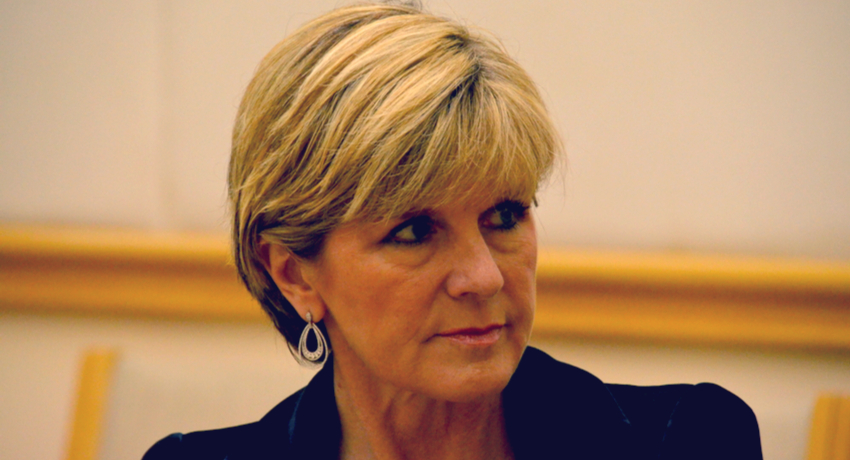Former Foreign Minister Julie Bishop was emphatic in her statement last week about the Australian parliament’s workplace culture: “Enough is enough”.
Her comments, in the aftermath of last month’s leadership spill, reinforce recent claims by parliamentarians that Australia’s federal parliament— and the Australian Liberal Party in particular—is not the place for women to seek a job.
 (Photo, The Conversation: Julia Banks MP and Julie Bishop MP take to the back bench)
(Photo, The Conversation: Julia Banks MP and Julie Bishop MP take to the back bench)
In the past week several MPs have publicly stated they’ve experienced or witnessed behaviour by their colleagues that they describe as bullying, intimidation, and stand-over tactics. While the leadership spill may be the catalyst for this current public airing, many describe it as emerging from a widespread and embedded culture.
…. both Senator Gichuhi and Senator Reynolds have since backed away from their bullying claims, saying they will make no further comment.
As the issue gathers momentum, the most prominent voices on workplace bullying have been women: Julia Banks, Lucy Gichuhi, Linda Reynolds, Kelly O’Dwyer, and now Julie Bishop. However both Senator Gichuhi and Senator Reynolds have since backed away from their bullying claims, saying they will make no further comment. Senator Reynolds told the Senate that she was “not giving up the fight”, but says its an internal matter for her party.
 (Photo: Minister for Women, Kelly O’Dwyer on ABC’s Insiders with Barrie Cassidy)
(Photo: Minister for Women, Kelly O’Dwyer on ABC’s Insiders with Barrie Cassidy)
It’s clear that workplace bullying has a strong gender dimension to it, but not for the reasons often cited. Women are not the only victims of bullying, nor are they less resilient: and as we know, women too can dish it out. Nevertheless, gender is relevant in this debate because workplace bullying has differential impacts on men and women.
Women are treated differently when they call out bullying.
Women are treated differently when they call out bullying. They’re invariably represented by media, colleagues and opponents as weak and unfit for leadership. Moreover, when women publicly acknowledge bullying they not only potentially jeopardise their own career, but their actions of calling it out tend to have ramifications more broadly that suggest all women in their sector ‘can’t hack it’.
Craig Kelly told Sky News “I think that you’ve got to roll with the punches in this game … It’s a rough-and-tumble game.”
Comments by male MPs denying bullying in the Liberal Party have hinted at this. Craig Kelly told Sky News “I think that you’ve got to roll with the punches in this game. We’re political parties. It’s a rough-and-tumble game.” Or, from Victorian Liberal President Michael Kroger: “I’ve spoken to a number of people since the ballot. None of them have said they were bullied or intimidated—male or female. This is politics. People do speak strongly to one another.”
 ( Photo ABC: Helen Kroger, Chair Federal Women’s Committe, Liberal Party)
( Photo ABC: Helen Kroger, Chair Federal Women’s Committe, Liberal Party)
Unhelpfully for those who have spoken out, a number of women have denied the culture of bullying in the Liberal Party, and refused to support female colleagues who have sought change. Former Liberal senator Helen Kroger—who now heads the Party’s women’s committee—has observed “It is a rough and tough game, politics. There is no two ways about it. It is an environment which is not for everyone.” Sussan Ley told RN Drive last week she had neverseen evidence of bullying in her party.
To many outside observers, the first week’s sitting of the new parliament has been dominated by a masculinist culture, hostile to both men and women
Comments responding to claims of bullying invariably blame the victim, rather than scrutinise offenders and – most importantly – account for the social context that fosters such claims. To many outside observers, the first week’s sitting of the new parliament has been dominated by a masculinist culture, hostile to both men and women. It’s timely therefore to note that BroadAgend’s national survey on gender equality attitudes, published last week, shows that when Australians were asked which areas of society were most sexist, politics came out on top.

Australia’s hyper-gendered culture has a particular impact upon women who must navigate an impossible double-bind in political life. They are expected to maintain an appropriate ‘good woman’ femininity, with no challenge to the status quo, while simultaneously proving to be ‘tough enough’ for the job.
… we need to separate political debate from outright intimidation.
Many of us work in industries which require the robust exchange of ideas, where views are tested and contested, and performance continually assessed. But we need to separate political debate from outright intimidation. Robust dispute can and should occur in government. The fate of the nation rests on the expectation that policies are researched, critiqued, and refined.
However, there is a difference between this and bullying—which, according to the Fair Work Commission is persistent unreasonable behaviour that can threaten someone’s health and safety.
By its very nature, politics has become a culture focused on zero-sum machinations of power. Factions and individuals point-score off one another—it is the tactics of corridor whispers and loyalties second-guessed, where chief protagonists can easily lose sight of parliamentary purpose.
 (Photo: Liberal Senator, Linda Reynolds this week backed away from her earlier comments slamming bullying.)
(Photo: Liberal Senator, Linda Reynolds this week backed away from her earlier comments slamming bullying.)
With the health of the Commonwealth at stake, let’s not under-estimate the courage and conviction of women who—even if belatedly—stand up and say “enough is enough”.
It was edifying to see Liberal Member for Chisholm, Julia Banks, simply walk away from her career, declaiming “I don’t need this”. But not all women have that option. Family commitments may mean women are less able to drop an income or relocate. We know persistent bullying affects productivity, self-confidence, and competitiveness — and we also know that women who call it out are likely to be blacklisted as ‘trouble-makers’.
 (Photo: Julia Banks MP on Sky News)
(Photo: Julia Banks MP on Sky News)
A culture of bullying is never addressed over a few meetings, in the space of weeks. And it is rarely fixed by internal review. The fact that an increasing number of women in politics have recently felt the need to speak publicly about this issue—and refer to mechanisms of redress outside the organisation—demonstrates a serious lack of capacity or will to redress it from within.
Perhaps we can sharpen Bishop’s lament of “enough is enough” with another famous Australian political maxim – ‘It’s time!’
(Editor’s Note: In a late evening address to Parliament on 12 September, Julia Banks called for gender quotas in the Liberal Party. She described the “appalling” political behaviour she has witnessed as “bullying, intimidation, harassment — sexual or otherwise — or a lack of integrity”. Source ABC News).




